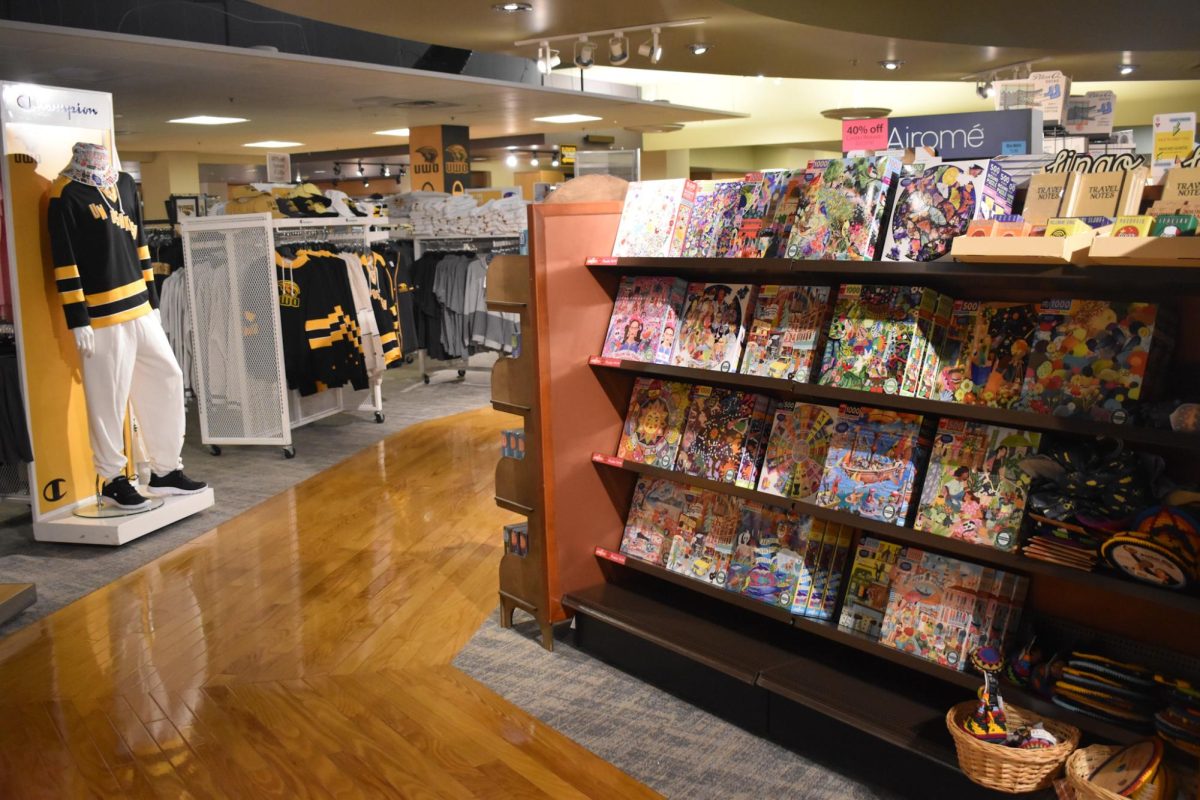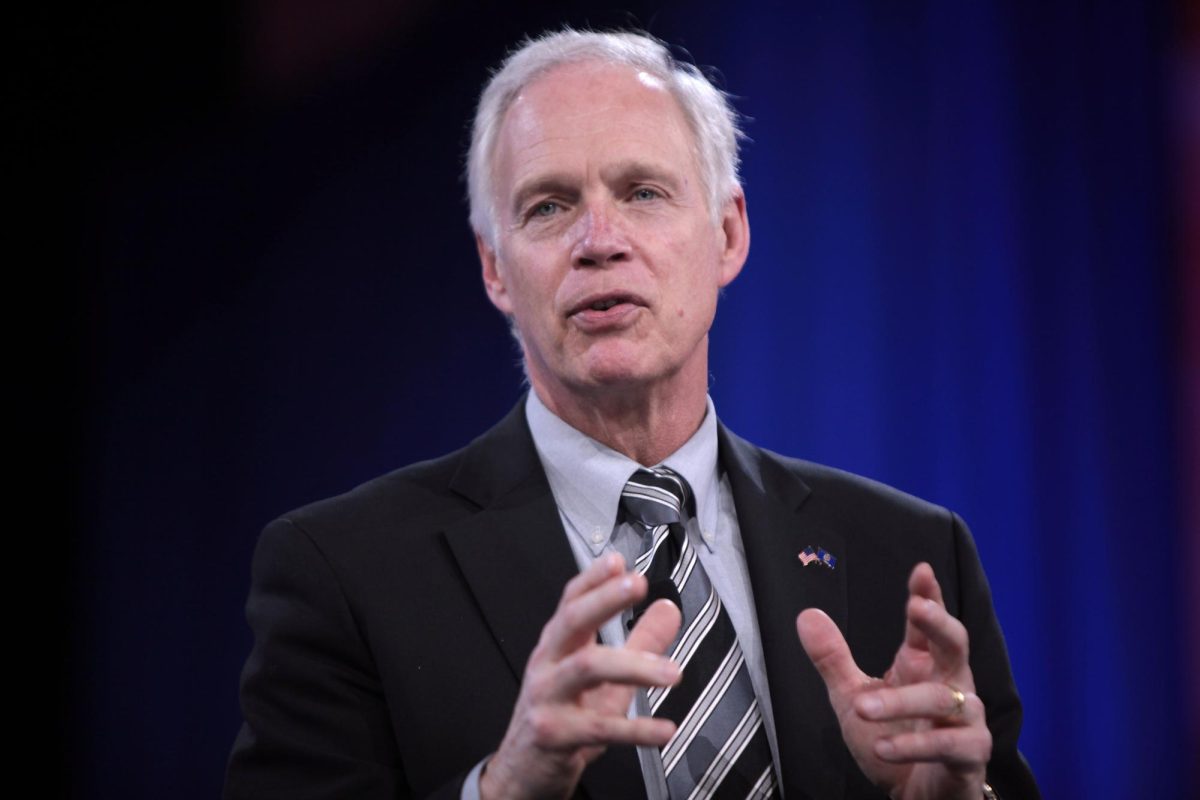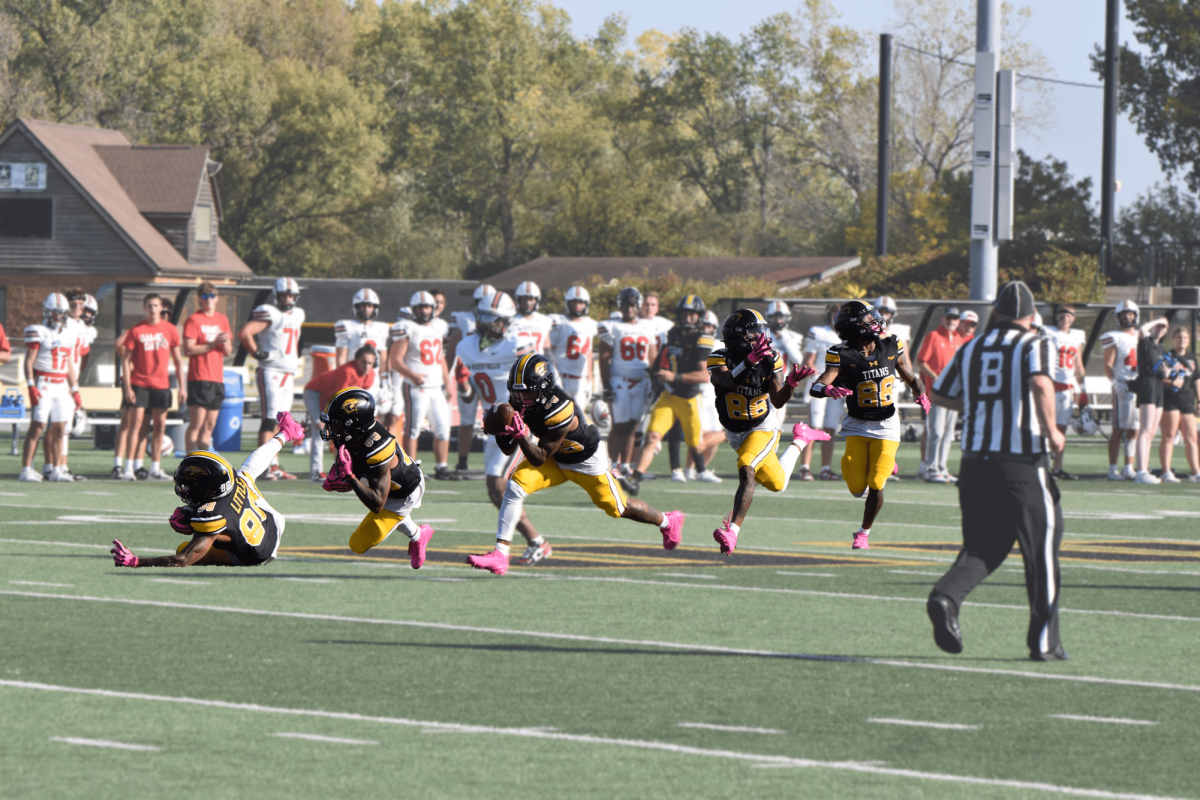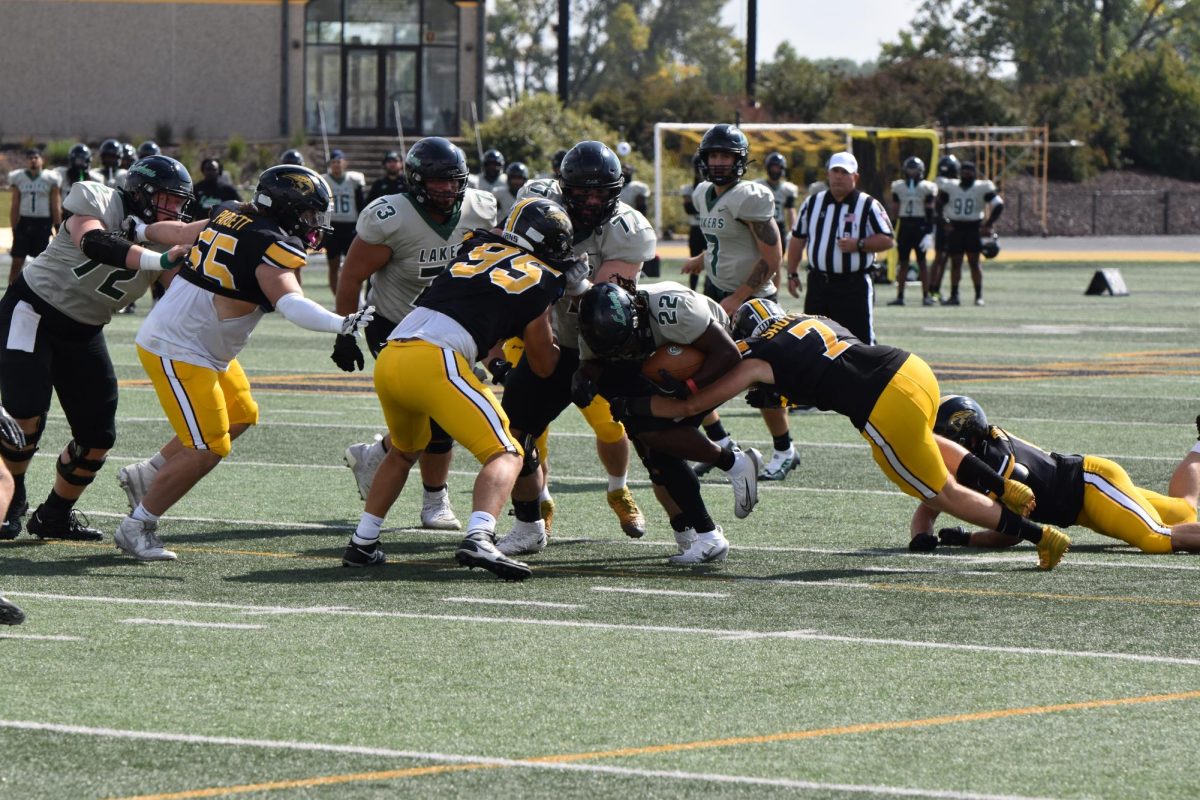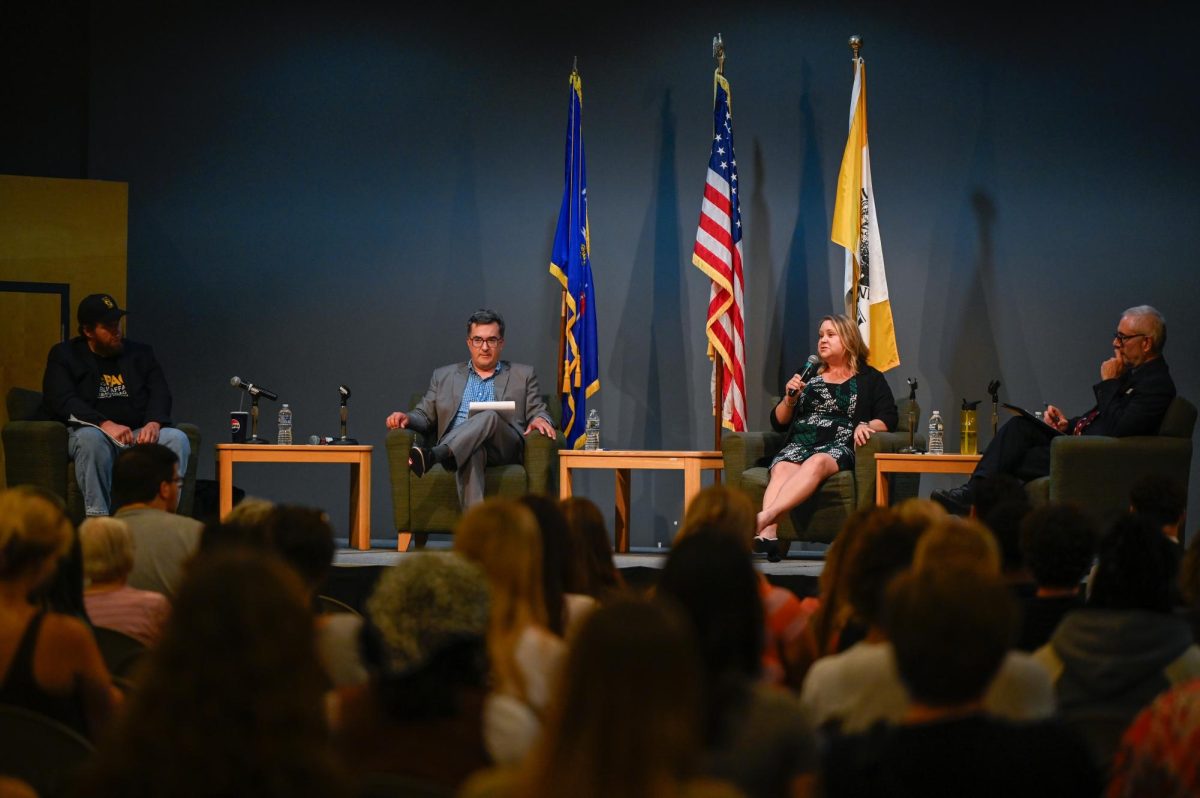Although UW Oshkosh is facing pushback from current and former University Books & More employees about a proposal to outsource bookstore employees, Chancellor Andrew Leavitt is determined to make changes to the business model of the store.
Leavitt said that while the university won’t make the decision to outsource or not until March 2025, there needs to be adjustments made to pull the bookstore out of an estimated $1 million deficit.
“Given our current financial state, it’s difficult to have a unit here at the university that’s just simply losing money like that in that case,” Leavitt said. “So we have to do something.”
Leavitt said that while there have been discussions about outsourcing the bookstore, nothing is a done deal.
“We have to find a situation that works now if, in fact, we can’t find a third-party vendor who can do that for us, then we are committed to continuing to be a self run bookstore,” Leavitt said. “We’re going to have to do it radically different, because we can’t continue to lose money.”
UWO released possible plans to outsource University Books & More employees to a third-party vendor at the beginning of the fall 2024 semester. The university published a report Aug. 9 that analyzed the business model of University Books & More and determined that the bookstore’s $1 million deficit is mostly due to post-pandemic recovery, inflation and a decrease in enrollment.
The report discussed ways to save costs related to the bookstore, which included moving to a third-party business model. The university determined that no changes at all to current bookstore operations are not financially viable.
According to the report, the university has a choice between two options. The first option would include keeping the bookstore independently owned, making their own “immediate and long-term changes” to save on costs and generate revenue. Some of these changes could include slashes in job opportunities and hours of operations as well as a spike in prices.
The second option would be to outsource to a third-party vendor to run the bookstore.
“…. the trade-off here can likely be summarized as one between accepting a bit longer time period before the bookstore is in the black (estimated to be the 2026 fiscal year) but retaining most of our bookstore’s high service quality and commitment to mission, or receiving more immediate financial relief but accepting an inevitable decrease in service and less control over an uncertain future,” the report by the Bookstore Business Model Task Group said.
An employee at the bookstore, who spoke with the A-T under a condition of anonymity, said that employees are scared to speak up about the situation because of fear of retribution from the university. They said that UWO hired a consultant to the bookstore, who is a former executive for the Follett Corporation.
According to the employee, the bookstore employs about 40 part-time student employees and seven full-time employees, all of which would likely lose their jobs.
The university’s report on University Books & More found that the bookstore has lost money every year since 2020, except for 2023, when it saw a profit of over $180,000 in COVID-19 federal relief funds. This year, the bookstore is expected to generate $3,911,076 of revenue, but due to the fact it costs the university over $4 million to run University Books & More, the business is estimated to be $160,000 in the red by the end of 2024.
Another University Books & More employee, who wished to be anonymous, said they were shocked when they found out the university was considering the outsourcing of employees.
“I’m not sure if I’m going to have a job in the future or not, and we still haven’t heard what’s going to happen to us student employees,” they said. “If I become jobless, it’s going to make it hard for me to afford things such as groceries.”
The employee said that they would really like the university to reconsider outsourcing the bookstore.
“I want them to rethink the decision because it could affect a lot of people and would create a lot of unnecessary stress that can be avoided,” they said.
A petition to prevent outsourcing of the bookstore posted on change.org garnered 664 signatures since it was posted on Nov. 19.
Leavitt said that he understands that it would be upsetting for bookstore employees to lose their jobs due to outsourcing.
“I understand certainly the attraction of working for UWO and the UW System and all of that,” Leavitt said. “But at the same time, I have an obligation to the institution to make sure that we continue to strengthen the financial picture of this institution. So there are eight employees that currently work at the bookstore, and those employees would be considered for employment with the third party vendor, which is a very standard step that is taken usually when these kinds of events occur.”
According to the report, if the university chooses to stick with an independently operated bookstore, UWO will need to make major changes to lift the business out of the red. These changes could include: increasing margins by 5-6%, reducing the hours of operation and student staff members, doubling the Instant Access digital course materials program and suspending the sponsorships of UWO athletics and the Titan Thunder marching band. Other changes that the Bookstore Business Model Task Group discussed were merging Copy This and Document Services into one unit in the bookstore, and remodeling University Books & More to add self-checkouts to reduce student labor.
The committee said in its report that the main reason for keeping the bookstore independently operated would be to maintain a place for students to work.
“It is clear from this group’s research that keeping our bookstore independently operated is the sole way to preserve anything like its current level of service to the university community and mission, yet UWO simply cannot afford for the bookstore to continue operating at a loss,” the report said. “Based on extensive conversations with UW peer institutions that have outsourced their bookstores, outsourcing seems almost certain to result in a less responsive bookstore with inferior service. Connections between the bookstore and students and faculty would be weakened, and a third-party vendors’ priorities would align more with their own corporate interests than with UWO’s.”
On the other hand, if the university chooses to outsource employees, the report found that the only benefit would be increased revenue and less time to bring the bookstore out of debt. But, the amount of revenue that outsourcing would bring in is hard to estimate because the committee determined that the textbook industry is less profitable than it once was and will continue to decrease in profitability for third-party vendors. This is because universities across the country are seeing declining enrollment numbers, and more classes are turning to digital materials.
“The same market factors that are hurting University Books & More are hurting retail chain stores, and those chain stores’ responses will prioritize protecting their profits — which can easily mean sacrificing the well-being of their university partners, as was clear when, for example, Barnes & Noble unilaterally shut off all service to UW Stevens Point during the height of COVID,” the report said.
There are only two college bookstore companies that the university can choose from to outsource to: Barnes & Nobles and Follet, both of which have been struggling to stay afloat. The report said that in the past, Follett has had issues making commission payments to UW schools.
“Follett indicated that their delinquency was due to industry-wide issues, including a lack of rebound from COVID, a decline in traditional course materials and the rise in Instant Access programs,” the committee said. “Follett shared with UW System partners that they are working to right-size their business and improve their liquidity, and assured UW of full payment of outstanding commission payments by the end of August. Follett will likely be renegotiating their contracts at UW System schools, with some contracts at risk for termination.”
Leavitt said that he had heard reports that of the nine system schools that currently outsource its bookstore employees, three of them are not satisfied with their relationship with the third party vendor.
“That is something that you can usually address through a contractual situation,” Leavitt said. “If you’re not happy with the services being provided, you have recourse. You can work with them in order to improve the service or maybe eventually break the contract. That doesn’t mean that we should never consider moving to a third-party, because some other institution somewhere else is having a difficult time with them when, in fact, on the whole, they’ve been pretty successful here in the UW System.”
The Bookstore Business Model Task Group said in its report that it expects the revenue and commissions obtained to be nowhere near the amount that other UW schools have made.
The committee determined that no matter what decision is made with the outsourcing, the corner convenience store will most likely need to close.
The report said that no third-party chain would agree to take over its operations in its current form.
“Our options would be only to close it entirely or to move a very small subset of its selection into the bookstore itself,” the Bookstore Business Model Task Group said. “The convenience store, despite its lack of value to corporate profits, is deeply valued by UWO students; the students this group spoke with cited it as the second of their two top priorities for us to consider in future bookstore operations. The convenience store offers vital access to food and personal care needs for a campus population with limited access to grocery stores.”
Leavitt said that the goal is to be transparent with everyone during the decision making process.
“There’s a possibility that we ended up [not outsourcing] the bookstore, but I think I owe it to this institution to go out to see if, in fact, we can find a third party vendor who can make this more financially sustainable,” Leavitt said.
Petition


